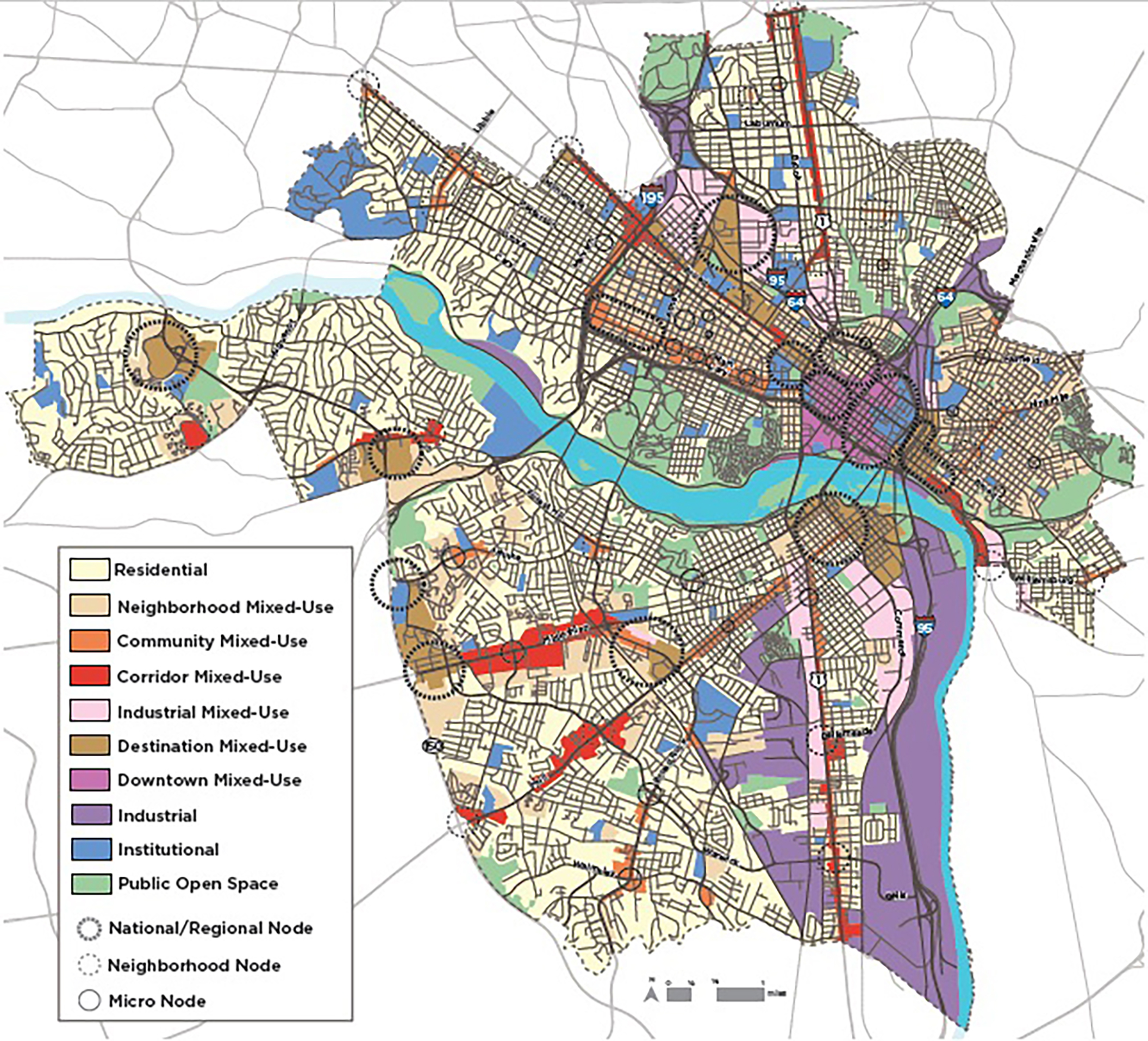
The zoning ordinance rewrite is a first step toward realizing future land use recommendations in the Richmond 300 plan, shown in map form above. (BizSense file)
The first comprehensive update in half a century to Richmond’s zoning ordinance is now underway.
The city has kicked off a two-year process to rewrite the ordinance – Chapter 30 of the city code – that, through zoning designations and mapping, regulates land use throughout the city.
Years in the making, the long-desired rewrite stems from Richmond 300, the 20-year master plan adopted in 2020 that recommends future land use in the city through 2037. The rewrite is the first of six “Big Moves” that the plan recommends implementing to achieve its goals.
Where Richmond 300 provides recommendations for future land use, the zoning ordinance rewrite would make that land use possible under the master plan’s vision, while also updating and fine-tuning the substance of the ordinance, the bulk of which dates to the mid-1970s.
As Kevin Vonck, the city’s Planning and Development Review director, put it to the Planning Commission in a presentation last month: “The master plan set the stage for future land use in the city. This is one of the major tools for implementation of achieving that future land use.”
Of the existing ordinance, which he described as out-of-date and out of step with the city’s current economic and demographic trends, Vonck added, “We will be unable to achieve the desired outcomes in Richmond 300 with it as it stands.”
Vonck noted that the circa 1976 ordinance stems from a time of suburban annexation and auto-centric development, with zoning districts and regulations blanketly applied across the city’s 62½ square miles that developed differently over time and, with annexation not an option, can no longer grow outward.
He also noted the city’s history of exclusionary zoning that affected residents and neighborhoods differently, as well as Richmond’s change from a shrinking population to a growing one over the past two decades.
“Richmond was not always growing, but over the last 20 years, we have definitely seen an increase,” Vonck said, adding that many provisions in the existing ordinance prohibit by-right development that aligns with current economic conditions and trends.
Called “Richmond 300: Code Refresh,” the rewrite aims to bring the ordinance up to date, using two dozen recommendations for zoning in Richmond 300 as a starting point and framework.
He said objectives include allowing neighborhoods to evolve without losing their sense of place; permitting a greater range of dwellings and housing types in the same buildings, properties or zoning district, as well as a greater range of compatible mixed-use in those places; and better correlating highway and transportation systems with land use.
Other objectives include regulating building placement to prioritize safer movement of pedestrians over vehicles; respecting existing historical, architectural, cultural and other resources; emphasizing the personality and character of existing neighborhoods and corridors; and writing the ordinance in a way that individuals can understand what they can do with their property.
The rewrite could also clean up and consolidate the different zoning districts that are used in the city. Currently, the existing ordinance totals 30 zoning districts.
The city has hired Code Studio, a consulting firm with offices in Atlanta and Austin, Texas, as its lead consultant on the code rewrite. Vonck said the firm, which recently completed a code rewrite for the City of Charlottesville, was selected over two others that responded to a request for proposals in late 2022.
Vonck said Code Studio’s contract currently totals $968,000, out of an approved project budget of $1.2 million. The contract covers Code Studio’s sub-consultants on the project: Avid Core, Brick & Story, Foursquare ITP, Gorove Slade, Harrell & Chambliss, RKG, and Utile.
The firms will work with the city and the project’s advisory council to create a citywide development pattern book and build a framework for the new ordinance and zoning districts, all of which are targeted for completion this year. Drafting of the new ordinance and zoning map is scheduled for completion in 2025.
The advisory council will consist of up to 17 members, at least 14 of them city residents, with two nominated by the Planning Commission, one by City Council and one by Mayor Levar Stoney.
Residents interested in serving on the council can apply through March 19 online and via paper applications at libraries and community centers. The public can also participate in the process via working groups, engagement sessions and public hearings that are to be held over the two years.

The zoning ordinance rewrite is a first step toward realizing future land use recommendations in the Richmond 300 plan, shown in map form above. (BizSense file)
The first comprehensive update in half a century to Richmond’s zoning ordinance is now underway.
The city has kicked off a two-year process to rewrite the ordinance – Chapter 30 of the city code – that, through zoning designations and mapping, regulates land use throughout the city.
Years in the making, the long-desired rewrite stems from Richmond 300, the 20-year master plan adopted in 2020 that recommends future land use in the city through 2037. The rewrite is the first of six “Big Moves” that the plan recommends implementing to achieve its goals.
Where Richmond 300 provides recommendations for future land use, the zoning ordinance rewrite would make that land use possible under the master plan’s vision, while also updating and fine-tuning the substance of the ordinance, the bulk of which dates to the mid-1970s.
As Kevin Vonck, the city’s Planning and Development Review director, put it to the Planning Commission in a presentation last month: “The master plan set the stage for future land use in the city. This is one of the major tools for implementation of achieving that future land use.”
Of the existing ordinance, which he described as out-of-date and out of step with the city’s current economic and demographic trends, Vonck added, “We will be unable to achieve the desired outcomes in Richmond 300 with it as it stands.”
Vonck noted that the circa 1976 ordinance stems from a time of suburban annexation and auto-centric development, with zoning districts and regulations blanketly applied across the city’s 62½ square miles that developed differently over time and, with annexation not an option, can no longer grow outward.
He also noted the city’s history of exclusionary zoning that affected residents and neighborhoods differently, as well as Richmond’s change from a shrinking population to a growing one over the past two decades.
“Richmond was not always growing, but over the last 20 years, we have definitely seen an increase,” Vonck said, adding that many provisions in the existing ordinance prohibit by-right development that aligns with current economic conditions and trends.
Called “Richmond 300: Code Refresh,” the rewrite aims to bring the ordinance up to date, using two dozen recommendations for zoning in Richmond 300 as a starting point and framework.
He said objectives include allowing neighborhoods to evolve without losing their sense of place; permitting a greater range of dwellings and housing types in the same buildings, properties or zoning district, as well as a greater range of compatible mixed-use in those places; and better correlating highway and transportation systems with land use.
Other objectives include regulating building placement to prioritize safer movement of pedestrians over vehicles; respecting existing historical, architectural, cultural and other resources; emphasizing the personality and character of existing neighborhoods and corridors; and writing the ordinance in a way that individuals can understand what they can do with their property.
The rewrite could also clean up and consolidate the different zoning districts that are used in the city. Currently, the existing ordinance totals 30 zoning districts.
The city has hired Code Studio, a consulting firm with offices in Atlanta and Austin, Texas, as its lead consultant on the code rewrite. Vonck said the firm, which recently completed a code rewrite for the City of Charlottesville, was selected over two others that responded to a request for proposals in late 2022.
Vonck said Code Studio’s contract currently totals $968,000, out of an approved project budget of $1.2 million. The contract covers Code Studio’s sub-consultants on the project: Avid Core, Brick & Story, Foursquare ITP, Gorove Slade, Harrell & Chambliss, RKG, and Utile.
The firms will work with the city and the project’s advisory council to create a citywide development pattern book and build a framework for the new ordinance and zoning districts, all of which are targeted for completion this year. Drafting of the new ordinance and zoning map is scheduled for completion in 2025.
The advisory council will consist of up to 17 members, at least 14 of them city residents, with two nominated by the Planning Commission, one by City Council and one by Mayor Levar Stoney.
Residents interested in serving on the council can apply through March 19 online and via paper applications at libraries and community centers. The public can also participate in the process via working groups, engagement sessions and public hearings that are to be held over the two years.




LONG overdue.
True but don’t worry they will screw it up; somehow they will screw up something they always due. I am not sure why any contractor would bid for city work. City is finance is notorious of late and overdue payments to its vendors (as in 9-15 months behind at times).
” Respecting existing historical, architectural, cultural and other resources” Is that an inside joke , considering what has transpired over the last few years ?
Almost all of Richmond’s growth has occurred in former industrial areas, what resources do you think have been disrespected?
great! Under current zoning the Fan and Museum District are illegal to build without numerous appeals.
It’s crazy that our most popular neighborhoods cannot be built by right.
Legalize the Fan!
Get ready for more NoVa-ization in the name of ‘equity’ and developer profits.
Oh and wait it will be like 1970s again too but instead of the Fan it will it parts of Church Hill, BH, and HP instead….based on C-ville changes. Existing SF homes will be bought on spec and by right be allowed to converted and add onto to allow 4-5 dwellings with only say 500 sq ft new building space. Pack in those students in with closet kitchenettes. 4 bedroom home/7 or 8 room home in Barton Heights will become 5 one bedroom studios.
Please apply to be a part of the advisory council! What a way to get directly involved in the future of our city. The deadline is approaching.